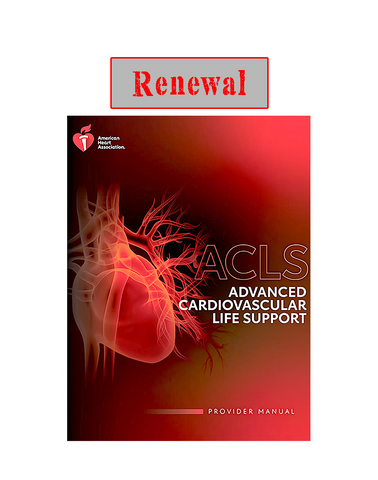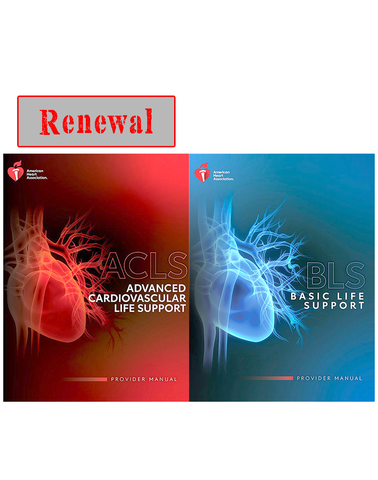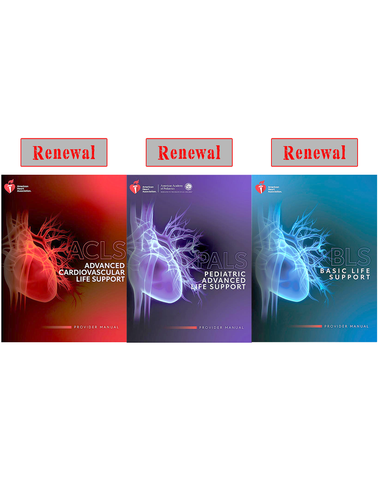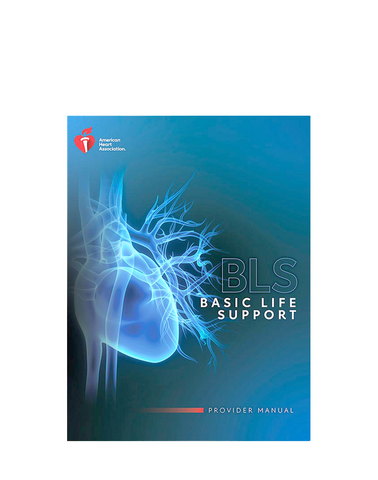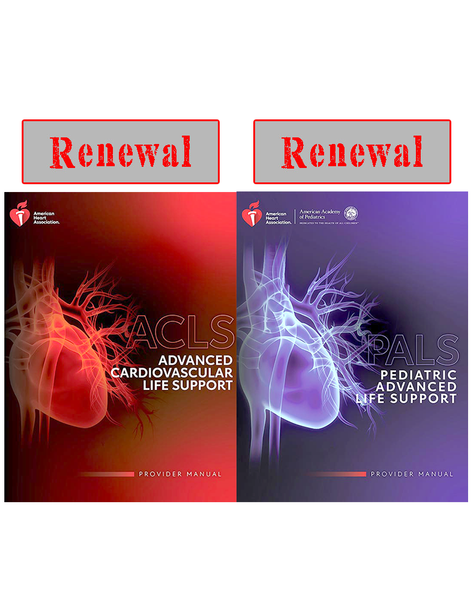
STAT CPR SOLUTIONS
ACLS RENEWAL with PALS RENEWAL
SHARE THIS CLASS
COURSE DESCRIPTION
All of our books are shipped priority, so you will get them in a timely manner before class. Another option is you could purchase the ACLS ebook here and/or the PALS ebook here.


***Please keep in mind that these are two separate classes with a lunch break in between. This is set up with a break to follow AHA guidelines. This also allows our Instructor time to have lunch as well. Thank you for understanding.
The ACLS RENEWAL course is stress free and relaxed. It is updated with the latest guidelines from the American Heart Association Guidelines for Cardiopulmonary Resuscitation and Emergency Cardiovascular Care.It is designed primarily for healthcare professionals in emergency departments, intensive care units, critical care departments, surgical areas, or pre-hospital environments, such as physicians, nurses, paramedics, respiratory therapists, and other professionals who may respond to a cardiovascular emergency. You will get your ACLS card right after the class which is valid for 2 years. We will explain everything in a way to easily understand and remember.
ACLS RENEWAL is based on realistic simulations reinforcing the following key concepts:
- High-Quality Basic life support skills, including effective chest compressions, use of a bag mask device and use of an AED.
- NEW Science of Resuscitation and Systematic Approach.
- Identifying and treating ischemic chest pain and acute coronary syndromes; recognizing other life threatening clinical situations (such as stroke)
- Megacode (Ventricular Fibrillation / Ventricular Tachycardia (VF/VT) (Out-of-Hospital and In-Hospital). ACLS algorithms and managing cardiac arrest.
- Recognition and early management of peri-arrest conditions such as symtomatic bradycardia, svt, ventricular tachycardia with pulses.
- Cardioversion, Defibrillation and Pacing. Airway management and confirmation devices.
- Related pharmacology including Atropine, Adenosine, Amiodarone, Epinephrine and Dopamine.
- Effective Resuscitation, Effective Communication, Team Dynamics and post-resuscitation care including therapeutic hypothermia.
- Coping with Death.
The PALS RENEWAL course is stress free and relaxed. It is updated with the latest guidelines from the American Heart Association Guidelines for Cardiopulmonary Resuscitation and Emergency Cardiovascular Care. It aids the pediatric healthcare provider in developing the knowledge, skills and strategies necessary to efficiently and effectively manage critically ill infants and children resulting in improved outcomes. We will explain everything in a way that is easy to understand and remember. It is designed for pediatricians, emergency physicians, family physicians, physician assistants, nurses, nurse practitioners, paramedics, respiratory therapists, and other healthcare providers who initiate and direct advanced life support in pediatric emergencies. The course uses a scenario based team approach to teach pediatric management of pediatric patients approaching or already in respiratory or cardiac arrest. You will receive your PALS card right after the course. All cards are valid for 2 years.
The PALS RENEWAL course teaches:
- to recognize infants and children at risk for cardiopulmonary arrest
- the strategies needed to prevent cardiopulmonary arrest
- skills needed to resuscitate and stabilize infants and children in respiratory failure, shock and cardiopulmonary arrest.
The PALS RENEWAL class gives Healthcare Providers the knowledge and skills to better recognize and treat critically ill infants and children. The course uses a scenario based team approach, to teach pediatric management of pediatric patients approaching or already in respiratory or cardiac arrest. The PALS course covers and reinforces the following key concepts:
- 1 and 2 rescuer Child CPR and AED use
- 1 and 2 rescuer Infant CPR
- BLS CPR for Children and Infants
- Cardiac, Respiratory and Shock case discussions and simulations
- Key changes in Pediatric Advanced Life Support, reflecting the new science guidelines for Cardiovascular Resuscitation and Emergency Cardiovascular Care
- Reinforces and teaches the strategies, treatments and skills needed to prevent cardiopulmonary arrest and the signs and symptoms of infants and children at risk for respiratory failure, shock and cardiopulmonary arrest
- Management of respiratory and shock emergencies
- Coping with death
- Rhythm disturbances and electrical therapy. (defibrillation and synchronized cardioversion)
- Post -Cardiac arrest care
- IO Vascular access ( Intraosseous ) and fluid bolus administration secrets
- Systematic Approach to Pediatric Assessments
- Effective resuscitation and team dynamics
Please call with any questions.


